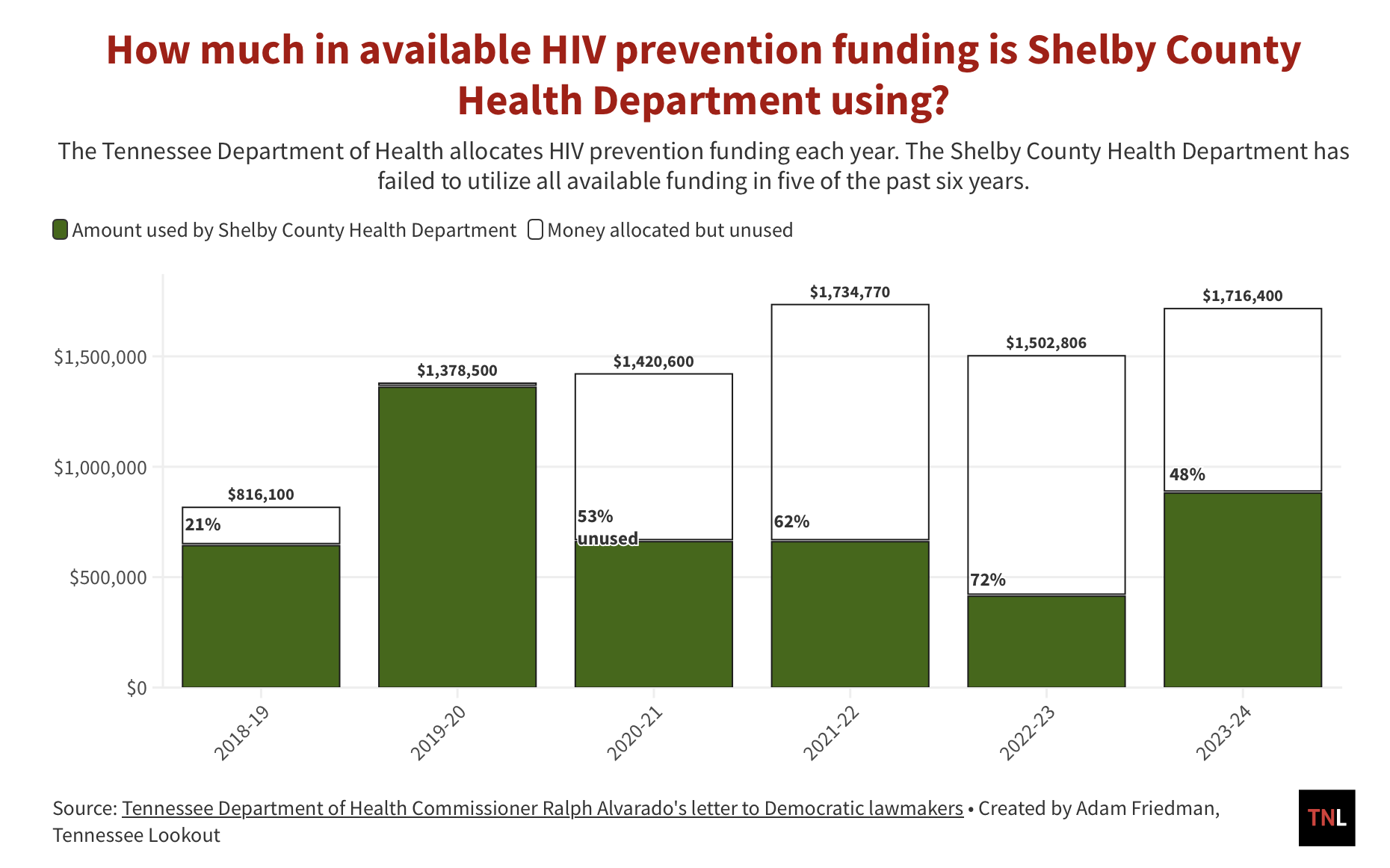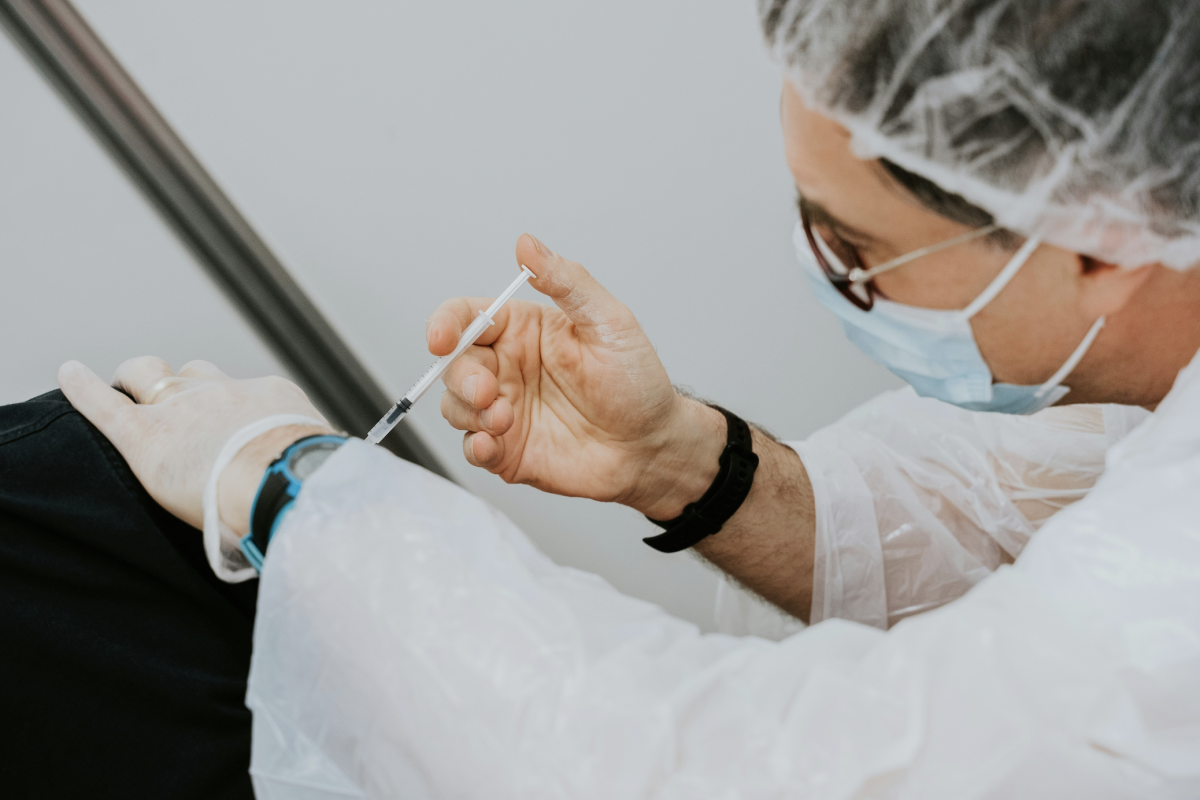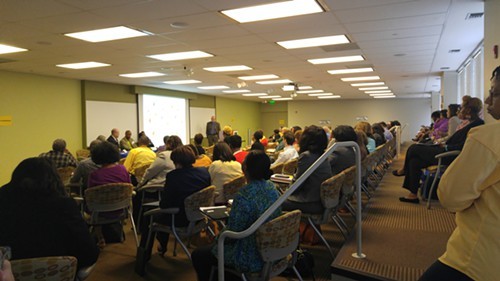Shelby County continues to experience one of the highest HIV rates in the nation – designated one of 48 “hotspots” that are collectively responsible for half of all new U.S. infections.
Despite the urgent need for intervention, the Shelby County Health Department has had to forfeit more than $3 million of the $8.6 million in federal HIV prevention funding it has received in the past five years, according to information provided to lawmakers by the Tennessee Department of Health.

The funding came from the Centers for Disease Control and Prevention (CDC), which – until last year – provided Tennessee with annual HIV prevention funding, distributed through the Tennessee Department of Health to local health departments and nonprofit organizations. Between 2019 and 2023, Shelby County’s share of the funding ranged from $816,000 to $1.7 million annually.
But in four of the past five fiscal years, Shelby County failed to tap all available CDC dollars. The money can be used to purchase HIV tests, hire public health workers to administer them and perform contact tracing to identify potentially additional cases. Last year, the county drew down just $410,000 of its $1.5 million grant.
In an August 23 letter to lawmakers highlighting the unspent funds, Tennessee Department of Health Commissioner Dr. Ralph Alvarado blamed CDC bureaucratic red tape and understaffing by the Shelby County Health Department.
A spokesperson for the Shelby County Health Department, in turn, blamed delays in executing contracts with the state health department, a process that also requires approval by the Shelby County Board of Commissioners and acceptance by county contracting officials.
The spokesperson also cited the Covid pandemic’s lingering impact over the past four years, as reassigned sexual health workers limited the number of HIV investigations funded by the grants.

Losing out on $3 million in HIV funding in Shelby County has troubled advocates who work with limited budgets to educate, test, and provide resources to individuals impacted by HIV.
“Folks are making decisions between $3,000 medications and a roof over their heads,” said Cherisse Scott, CEO of Sister Reach, a Memphis reproductive health organization.
Sister Reach operates mobile vans that travel into underserved communities to offer testing and support. At $63 per HIV test, it’s a struggle to provide the service, she said. “The fact is those dollars have not trickled down” Scott said.
Rep. G.A. Hardaway, a Memphis Democrat, said Wednesday he planned to discuss the HIV expenditures with Shelby County health officials and local HIV advocates – and potentially the Tennessee Comptroller’s office, which is charged with investigating uses of public funding.
“Anytime we have federal dollars that cannot be spent in a timely fashion, we have to figure out why,” said Hardaway, who noted that local health officials may not have been in a position to responsibly spend money that came to them late in a grant cycle.
“We don’t want to get into a pattern where there’s too much red tape or we’re creating a situation where people are being rushed into spending in a way that would be ineffective,” he said.
Rising HIV rates
The letter from Dr. Alvarado outlining Shelby County HIV spending was sent in response to questions from Democratic lawmakers concerned that teens seeking HIV tests, along with other healthcare services, were being turned away from public health clinics if they did not have a parent’s permission.
Public health clinics began turning away unaccompanied teens on July 1st, shortly after Gov. Bill Lee signed a new state law requiring parental consent for healthcare services, the Lookout reported.
The state health department has since reversed course, instructing public health clinics to resume providing sexually transmitted disease testing and birth control to teens.
Rising rates of HIV in Shelby County sparked concern earlier this year when the Tennessee Department of Health and the Shelby County Health Department jointly issued a news alert. “Shelby County is experiencing a peak in a six-year trend of increasing HIV and syphilis infections,” Tennessee Department of Health Chief Medical Officer Dr. Tim Jones said in the new release. “Testing is critical in reducing these rates.”
The release noted a 36 percent increase in HIV rates in Shelby County since 2018 and a 40 percent increase among those 15- to 19-years old between 2018 and 2023.
The news has prompted renewed action among nonprofit advocates to stem the growing rates of HIV.
Conflicting disease data
But in his August 23rd letter to lawmakers, Dr. Alvarado said the number of newly diagnosed HIV infections have decreased in the past 14 months – a message at direct odds with previous public statements from his department.
Dr. Alvarado noted there had been a two-year backlog in investigating HIV cases at the Shelby County Health Department. Once the backlog was resolved, he noted, “there was not a significant, acute spike or ‘outbreak’ indicated, as reported by the press.”
Tennessee public clinics resume offering birth control, sexual disease tests to unaccompanied teens
The letter does not make clear how resolving the backlog in investigations resulted in fewer reported cases. Investigations, which include contact tracing to identify and test intimate partners, may result in more positive cases rather than fewer. The state health department did not respond to questions about the investigations.
Dr. Alvarado provided lawmakers with charts showing the number of HIV infections in Shelby County decreased from 358 in 2022 to 329 in 2023. Among teens in the county, the number of new infections increased from 22 to 37 during the same time period.
The data provided uses infection numbers, not rates of infections – a typical public health metric previously cited in health department press releases about HIV prevalence in Shelby County that measures the number of infections compared to population size.
The department did not respond to numerous requests seeking clarity on HIV infections in Shelby County.
Dr. Alvarado noted that the decrease in the number of HIV infections coincided with the rejection of federal HIV funding from the CDC by the Lee administration. Last year, Lee announced he would forgo all future CDC HIV prevention funding in a move widely seen as a politically-motivated effort to block the federal dollars from also going to Planned Parenthood clinics in Tennessee.
The state has since allocated its own funding for HIV prevention efforts. Shelby County this year received $1.7 million in state dollars and has thus far spent $885,000 on prevention efforts.
Tennessee Lookout is part of States Newsroom, a nonprofit news network supported by grants and a coalition of donors as a 501c(3) public charity. Tennessee Lookout maintains editorial independence. Contact Editor Holly McCall for questions: info@tennesseelookout.com. Follow Tennessee Lookout on Facebook and X.


